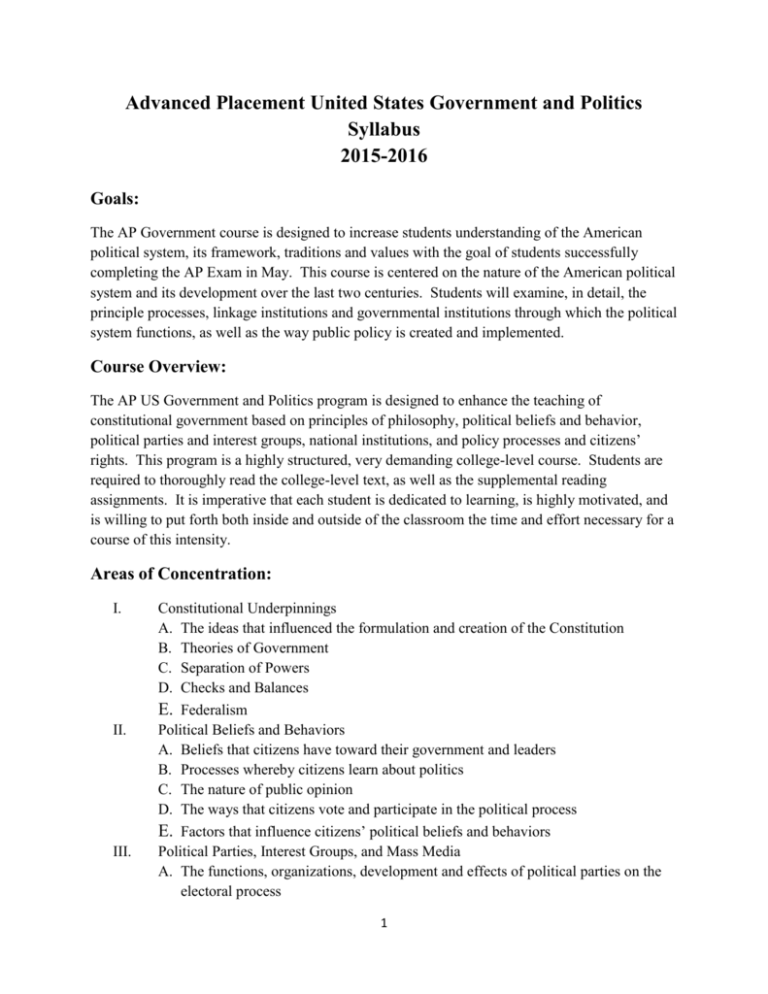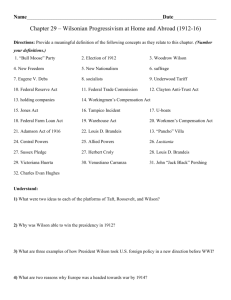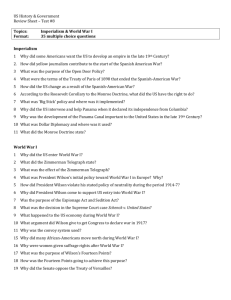
Advanced Placement United States Government and Politics
Syllabus
2015-2016
Goals:
The AP Government course is designed to increase students understanding of the American
political system, its framework, traditions and values with the goal of students successfully
completing the AP Exam in May. This course is centered on the nature of the American political
system and its development over the last two centuries. Students will examine, in detail, the
principle processes, linkage institutions and governmental institutions through which the political
system functions, as well as the way public policy is created and implemented.
Course Overview:
The AP US Government and Politics program is designed to enhance the teaching of
constitutional government based on principles of philosophy, political beliefs and behavior,
political parties and interest groups, national institutions, and policy processes and citizens’
rights. This program is a highly structured, very demanding college-level course. Students are
required to thoroughly read the college-level text, as well as the supplemental reading
assignments. It is imperative that each student is dedicated to learning, is highly motivated, and
is willing to put forth both inside and outside of the classroom the time and effort necessary for a
course of this intensity.
Areas of Concentration:
I.
II.
III.
Constitutional Underpinnings
A. The ideas that influenced the formulation and creation of the Constitution
B. Theories of Government
C. Separation of Powers
D. Checks and Balances
E. Federalism
Political Beliefs and Behaviors
A. Beliefs that citizens have toward their government and leaders
B. Processes whereby citizens learn about politics
C. The nature of public opinion
D. The ways that citizens vote and participate in the political process
E. Factors that influence citizens’ political beliefs and behaviors
Political Parties, Interest Groups, and Mass Media
A. The functions, organizations, development and effects of political parties on the
electoral process
1
B.
C.
D.
E.
IV.
V.
VI.
The laws governing the electoral process
The various types of interest groups in American society
The effectiveness, activities, and characteristics of interest groups
The role of money in today’s electoral process and government
F. The functions and impact of the media on the governing process
Institutions of the National Government
A. The formal and informal institutions in American government
B. The relationship among the formal and informal institutions and the balance of
power between all institutions
C. Linkages between the institutions and political parties, interest groups, public
opinion, the media and the voters.
Civil Rights and Liberties
A. The development of civil rights and civil liberties through judicial interpretation
B. The knowledge of substantive rights and liberties
C. The impact of the Fourteenth Amendment on the constitutional development of
civil rights and liberties
Public Policy
A. The ways of making policy in a democratic society
B. The formulation of policy agendas
C. The role of formal and informal institutions in the creation of public policy
D. Linkages between policy making and the formal and informal institutions,
political parties, interest groups, public opinion, elections, and the American
citizens
Grades:
Each six week’s grade is the average of work in the following percentages:
Projects and Assignments
Tests and Quizzes
Class Participation
Homework
Total:
30%
40%
15%
15%
100%
At the end of each semester, an exam will be administered that will be 20% of the student’s
semester grade. Students are required to attend a local government meeting at least once each
semester. Attendance will count as 30 points on the midterm and final exams. This course uses a
10 point grade scale.
The final grade for the course will be determined by averaging the first and the second semesters
together for a final grade.
2
Students will receive a progress report at the end of the 3rd week of each six weeks.
Tests and Quizzes:
Students are expected to read current events from reputable news sources such as the New York
Times, the Washington Post, Reuters, NPR, etc. Each week, students will have a 10 question, 10
point current events quiz.
Students will also have exams at the end of each chapter as indicated below. Should a student
miss a current event quiz or test, they are expected to make up that test within 5 days of their
return.
Homework:
Students are expected to complete homework assignments independently. If students turn in the
same work with different names, this will result in a grade of a 0 and a referral to the office.
This is cheating. Cheating will not be tolerated.
Make Up Work:
All make up work is expected to completed within five days of return to school. You will need
to get all make up work from Ms. McDonald. You will receive a grade of a zero for any
assignment that is outstanding after five days.
Textbooks:
Wilson, James, John Dilulio and Meena Bose; American Government Institutions and Policies,
Cengage Learning. ISBN 978-0-495-80283-9
How to Prepare for the AP Government and Politics Exam, Barrons Educational Series, Inc.
ISBN 0-7641-1651-7
Serow, Ann G. and Everett C. Ladd, ed., The Lanahan Readings in the American Polity,
Lanahan Publisher, Inc. ISBN 978-1-930398-09-2
Woll, Peter. American Government Readings and Cases, 17th Edition, Pearson Longman.
ISBN 978-0-321-47314-1
Contact Information:
Instructor: Tracee McDonald
Phone Number: 540-337-1921
3
Email: tmcdonald@augusta.k12.va.us
Advanced Placement Exam:
Advanced Placement review will take place for one week prior to the AP exam, which is given
each May. The exam will consist of two sections: 60 multiple choice questions that will be
completed in 45 minutes and 4 free response questions that will be complete in 100 minutes.
You may practice questions at www.collegeboard.com.
Format:
The format for this extensive study includes lectures, readings, discussions, and analytical
writings. All student assessments will be based on the Advanced Placement exam format which
includes multiple choice and free response essays.
Study Areas
A. Constitutional
Underpinnings
The Study of American
Government
Text
Chapter
1
The Constitution
2
Federalism
3
Readings
Date
(all
assignment
due at the
end of the
week)
Wilson p.4-17
Week 1
The Declaration of
Independence
The American Commonwealth
by James Bryce
Democracy in America by
Alexis deTocqueville
Wilson P.20-49
Week 1
Federalist 10 and 51
Anti-federalist 17 and 84
The Constitution
The English Bill of Rights
The Magna Carta
“A Machine that Would Go
Of Itself” by Michael
Kammen
Wilson P. 52-75
Week 2
Federalist 39, 44, and 45
Laboratories of Democracy
by David Osborne
McCulloch v Maryland
4
Gibbons v Ogden
United States v Morrison
American Federalism by
Daniel Elazar
II. Political Beliefs and Behaviors
American Political Culture
4
Public Opinion
7
Political Participation
Wilson P. 78-95
“Who Governs” by Robert
Dahl
US Census Bureau
Wilson P. 156-173
Public Opinion and American
Democracy Why Americans
Still Don’t Vote by VO Key
The Phantom Public by
Walter Lippmann
www.vote-smart.org
www.fairvote.org
Week 3
8
Wilson P. 176-190
Why Americans Still Don’t
Vote by Richard Cloward
Week 4
III. Political Parties, Interest
Groups, and the Media
Political Parties
9
Wilson p. 194-221
Party Platforms
The Values Divide by John
White
Toward a More Resposible
Two-Party System
www.rnc.org
www.democrats.org
Week 5
Campaigns and Elections
10
Interest Groups
11
Wilson p. 224-259
Week 5
Buckley v Valeo
Dirty Politics by Kathleen
Hall Jamieson
No Place for Amateurs by
Dennis Johnson
www.fec.gov
www.campaignline.com
Wilson p. 262-285
Week 6
Money, PACs, and Elections
by Larry Sabato
The Lobbyists by Jeffrey
Birnbaum
The Governmental Process by
5
Week 4
David Truman
Wilson p. 287-309
Feeding Frenzy by Larry
Sabato
Where Have All the Voters
Gone by Martin Wattenberg
Personal History by
Katharine Graham
The Media
12
IV. Institutions of the National
Government
Congress
13
Wilson p. 314-357
Federalist Papers 53, 56, 57,
58, 62, 63
Stalemate by Sarah Binder
Congress-Bashing for
Beginners by Nelson Polsby
Congress: The Electoral
Connection by David
Mayhew
Pork: A Time Honored
Tradition Lives On by Paul
Starobin
http://clerk.house.gov
www.senate.gov
Weeks 7-8
President
14
Wilson p. 360-399
Federalist 70
Presidential Power and the
Modern Presidents by
Richard Neustadt
The Presidential Character
by James David Barber
The Paradoxes of the
American Presidency by
Thomas Cronin and Michael
Genovese
With the Stroke of a Pen by
Kenneth Mayer
www.whitehouse.gov
Weeks 9-10
Judiciary
16
Wilson p. 430-457
Federalist 78
Marbury v Madison
Judicial Self-Restraint by
John P. Roche
Pursuit of Justices by David
Week 11
6
Week 6
Yalof
www.supremecourtus.gov
Bureaucracy
15
Wilson p.402-427
The Rise of the Bureaucratic
State by James Q. Wilson
Locked in the Cabinet by
Robert Reich
A Government of Strangers
by Hugh Heclo
In the Web of Politics by Joel
Aberbach and Bert Rockman
www.gpoaccess.gov
Week 12
V. Civil Rights and Liberties
Civil Liberties
5
Week 13
Civil Rights
6
Wilson p. 98-123
Anti-Federalist 84
Gideon’s Trumpet by
Anthony Lewis
Engel v Vitale
Griswold v Connecticut
Roe v Wade
Miranda v Arizona
NY Times Co v Sullivan
University of CA Board of
Regents v Bakke
Rights Talk by Mary Ann
Glendon
www.landmarkcases.org
www.firstamendmentcenter.o
rg
Wilson p. 126-151
Plessy v Ferguson
Brown v Board of Education
Civil Rights Cases
Letters from Birmingham Jail
Simple Justice by Richard
Kluger
From Identity to Politics by
Craig Rimmerman
www.landmarkcases.org
VI Public Policy
The Policy Making Process
17
Wilson p. 462-482
Presidential Powers in Times
of Emergency by Thomas
Cronin
Week 15
7
Week 14
Foreign and Defense Policy
20
Wilson p. 526-553
Jihad v McWorld by
Benjamin Barber
The Clash of Civilizations by
Samuel Huntington
Soft Power by Joseph Nye
Blowback by Chalmers
Johnson
www.aei.org
Week 16
Economic Policy
18
Week 16
Social Policy
19
Wilson p. 486-504
The Other America by
Michael Harrington
www.cbpp.org
Wilson p. 508-523
Flat Broke with Children by
Sharon Hays
www.clasp.org
Final Exam Review
AP Exam Review
Chapters
1-20
Week 16
Week 17
April
May 2010
AP Exam
8
Websites for Additional Readings:
www.yale.edu/lawweb/avalon/federal/fed.htm (Federalist Papers)
www.oyez.org/oyez/frontpage (Court Cases)
www.whitehouse.gov/government/cabinet.html (White House)
www.gpoaccess.gov/index.html (Government Printing Office)
http://web.utk.edu/~dhouston/amergovt/groups.html (Interest Groups)
www.rnc.org (Republican Party)
www.democrats.org (Democratic Party)
www.politics1.com/parties.htm (Minor Parties)
www.constitutioncenter.org/constitution (Constitution)
http://clerk.house.gov (House)
www.senate.gov (Senate)
www.supremecourtsus.gov (Supreme Court)
http://www.fec.gov (Elections)
www.campaignline.com (Campaigns)
www.fairvote.org (Voting)
http://ethemes.pearsoncmg.com/0131780034 (Website to use for news journals)
www.prenhall.com/magleby (Website for textbook)
www.firstamendmentcenter.org (Amendments)
www.nytimes.com (Articles)
www.usatoday.com (Articles)
www.washingtonpost.com (Articles)
www.landmarkcases.org (Supreme Court Cases)
www.cnn.com/EVENTS/1997/mlk/links.html (Civil Rights)
www.learner.org/view_programs/view.programs.html (Videos)
www.unitedstreaming.com (Videos)
http://congress.indiana.edu (Congress)
www.vote-smart.org (Voting)
www.cbpp.org (Economic Policy)
www.clasp.org (Social Policy)
www.aei.org (Foreign Policy)
The Augusta County School Board does not discriminate on the basis of race, color, national origin, religion, age, disability, or
gender in its programs and activities and provides equal access to the Boy Scouts and other designated youth groups. The
following persons have been designated to handle inquiries regarding non-discrimination policies:
Title IX Coordinator
Jill R. Martin
Director of Personnel
PO Box 960
18 Government Center Lane
Verona, VA 24482
(540) 245-5107
Section 504 Coordinator
Douglas W. Shifflett, Jr., Ed.D.
Asst. Superintendent for Administration
PO Box 960
18 Government Center Lane
Verona, VA 24482
(540) 245-5108
9
Curricular Requirements
Curricular Requirement
The course provides students with practice in
analyzing and interpreting data and other
information relevant to US Government and
Politics
The course includes supplemental readings,
including primary source materials (such as
The Federalist Papers) and contemporary news
analyses.
The course requires students to answer
analytical and interpretive free response
questions on a frequent basis.
Clear, Explicit Evidence of Each Curricular
Requirement
Students are required to:
Interpret charts and graphs depicting
various concepts and ideas found in the
governing process
Prepare visually stimulating
presentations depicting various
concepts and ideas found in the
governing process
Evaluate charts and graphs from
selected websites for the purpose of
understanding various concepts in the
governing process
Students are required to:
Read and journal daily an article from
the New York Times, Washington Post,
or USA Today to keep abreast of
current events both nationally and
internationally
Listen to or watch a news broadcast
daily
Read assigned supplemental readings
from The American Polity
Read the United States Constitution,
Declaration of Independence, Articles
of Confederation, selections of the
Magna Carta, English Bill of Rights,
the Petition of Right
Read various selections of the
Federalist Papers
Read various articles from teacher
selected websites
Attend one government meeting in the
Fall and one in the Spring
Students are required to:
Compose a 5 point essay on each
chapter examined throughout the
course.
10







